한국응용과학기술학회 논문 검색
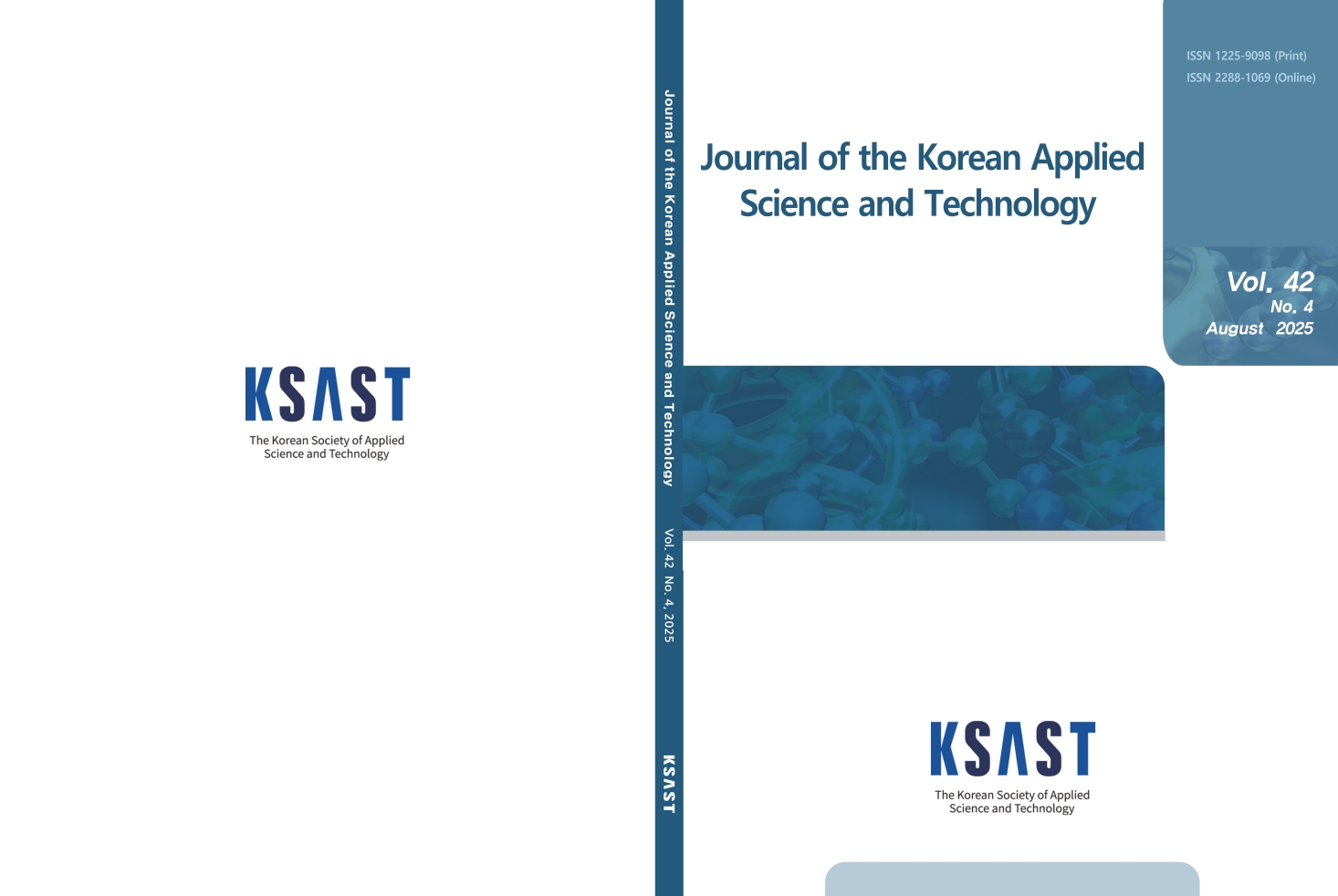
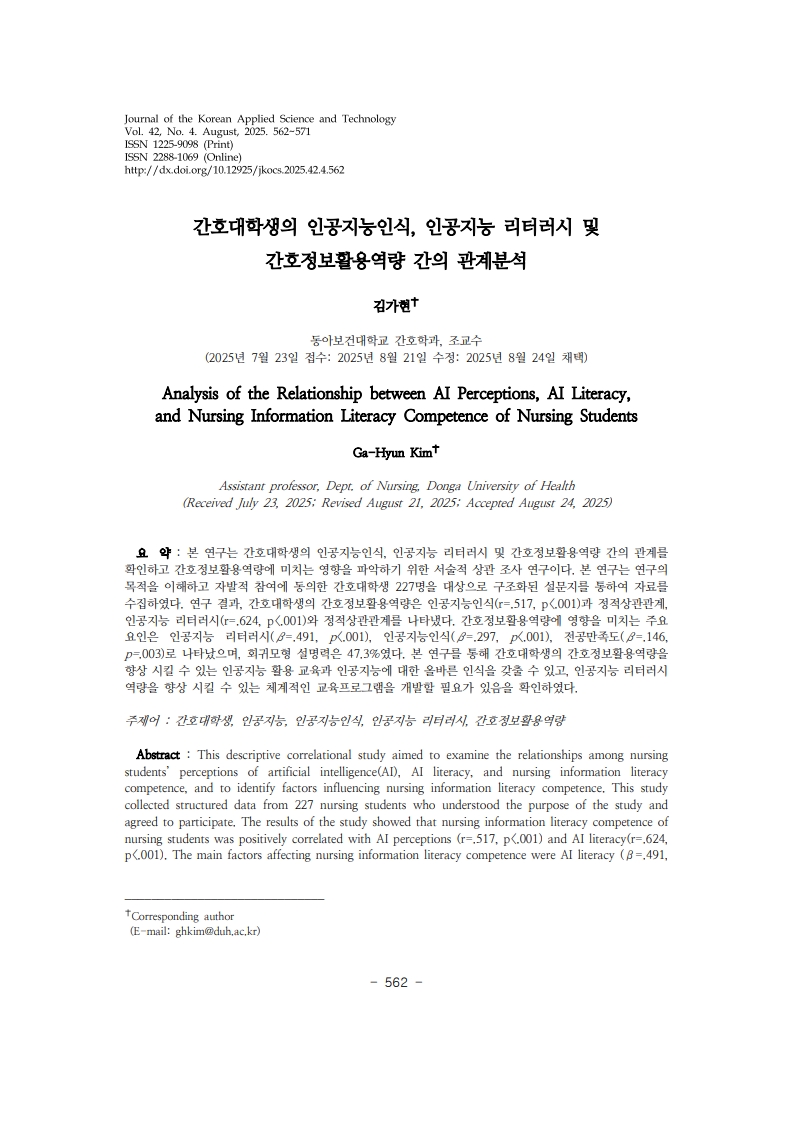
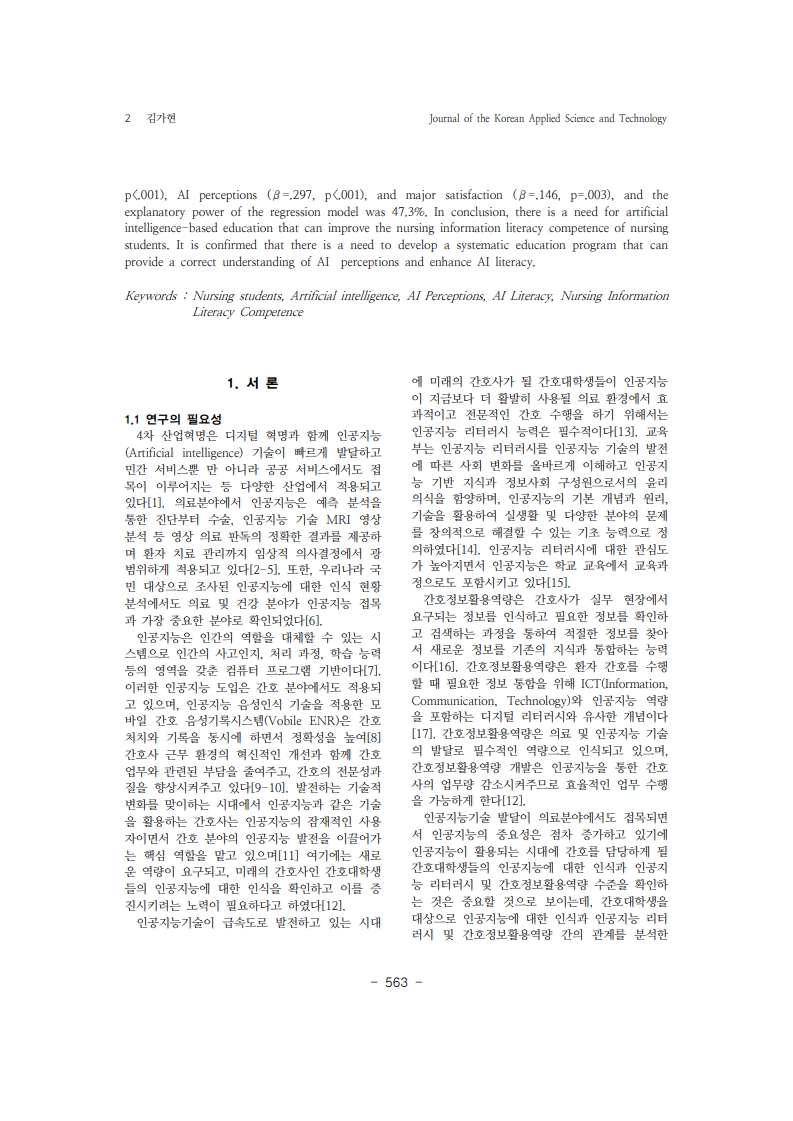
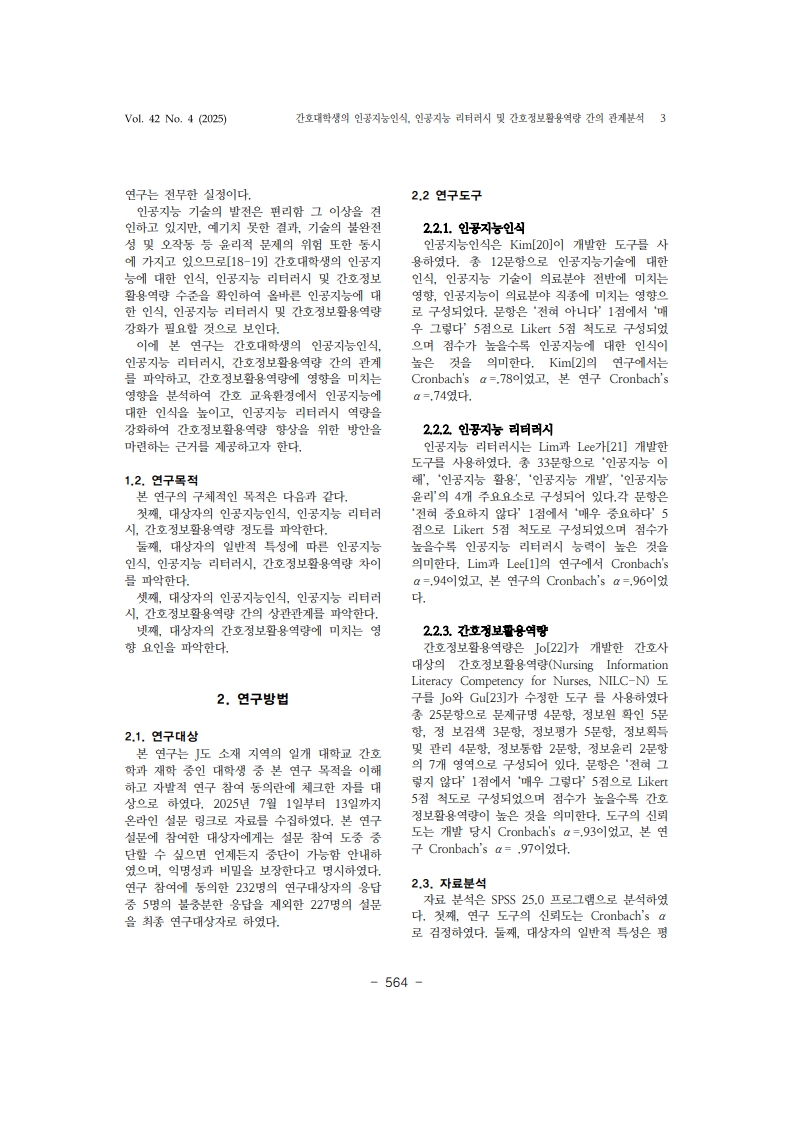
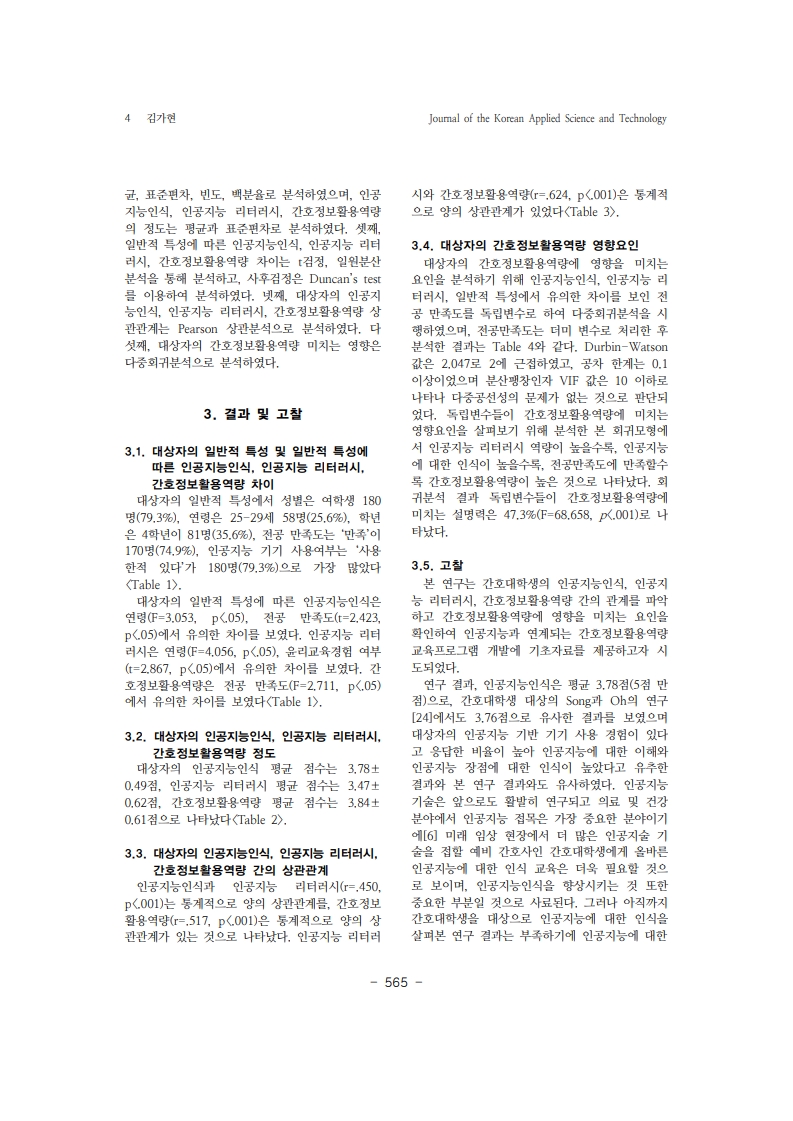
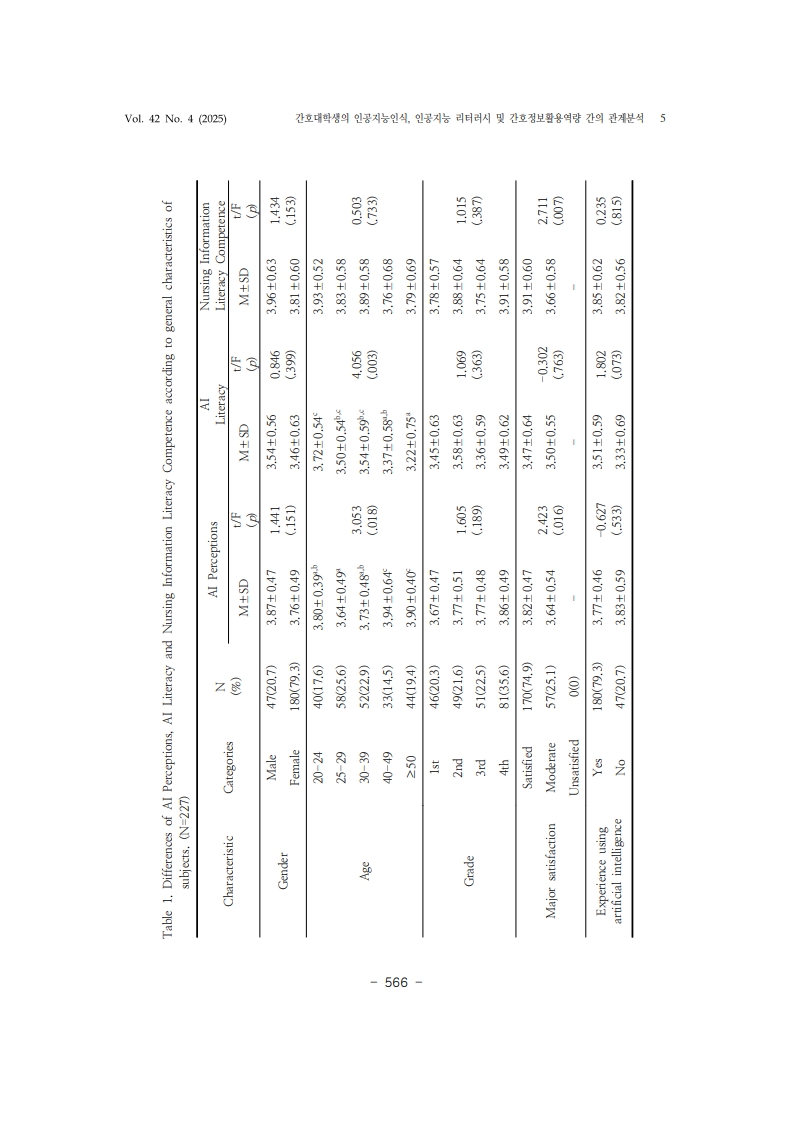
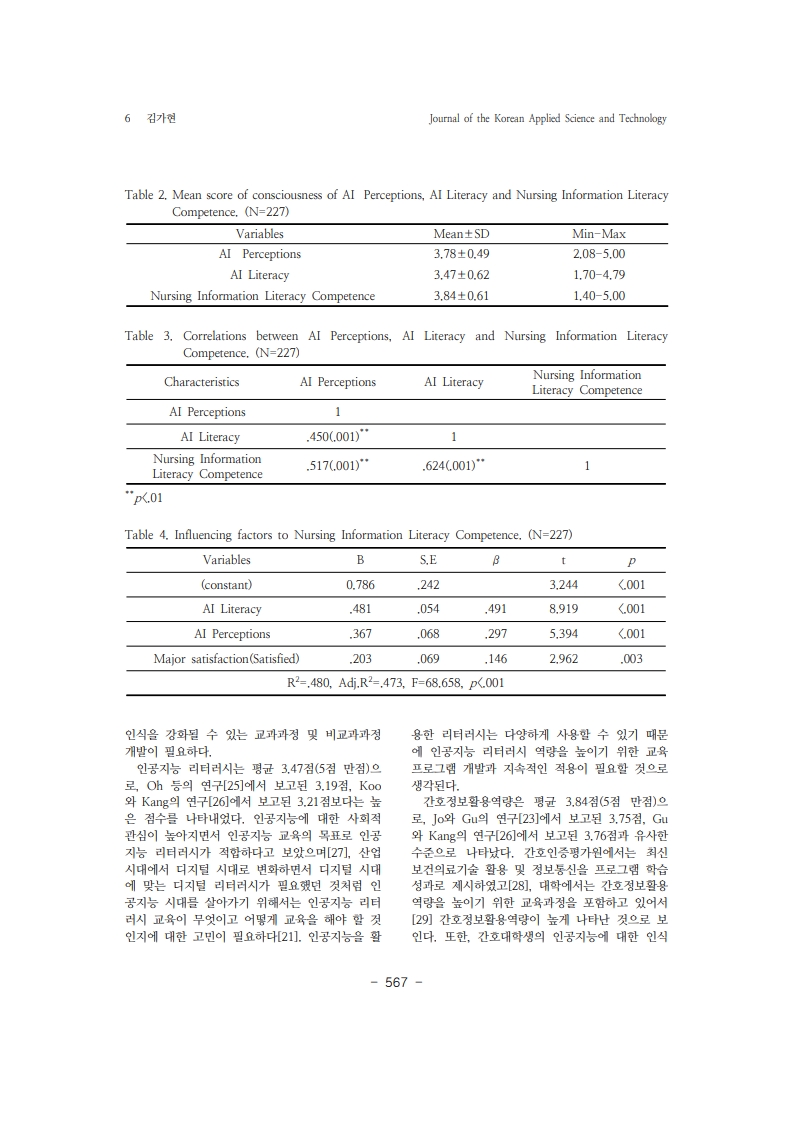
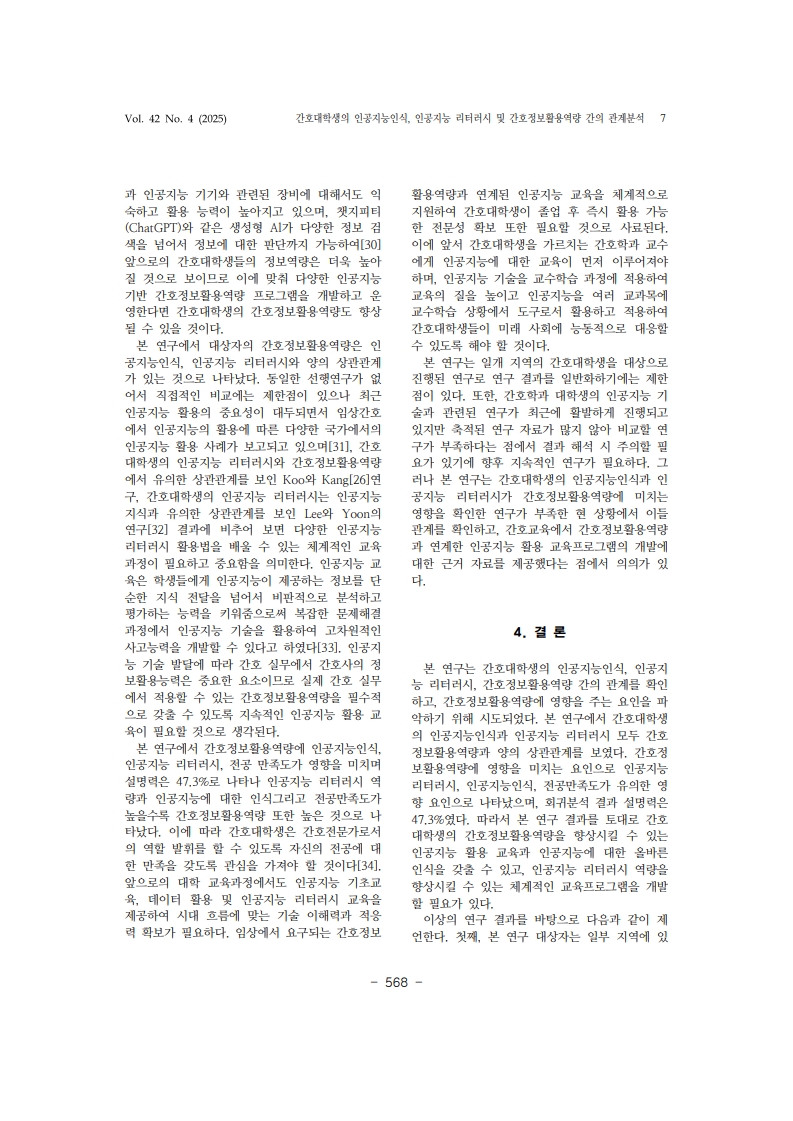
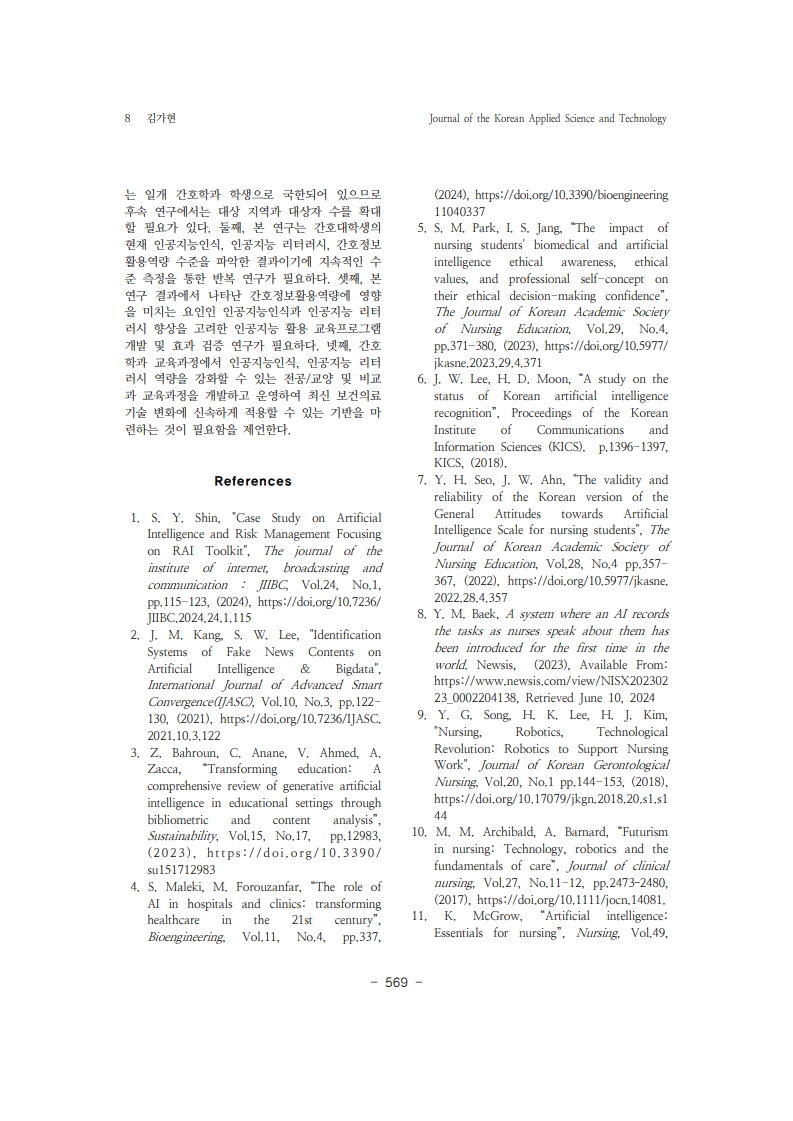
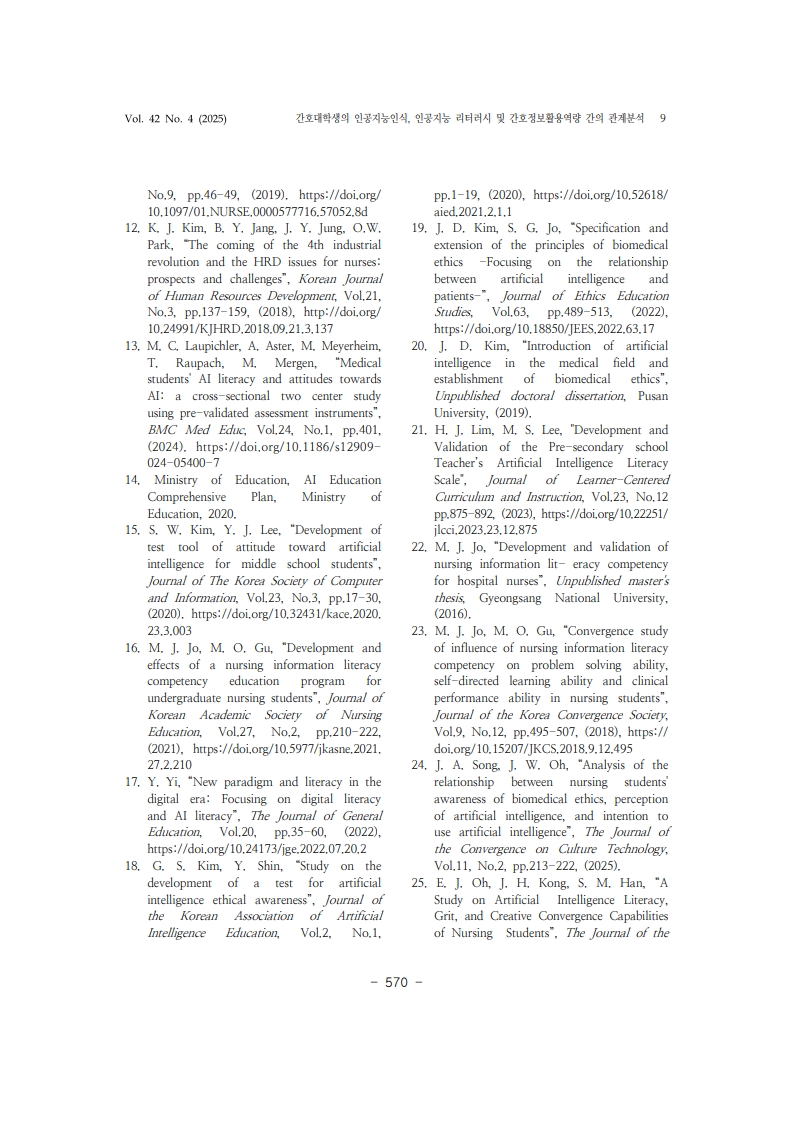
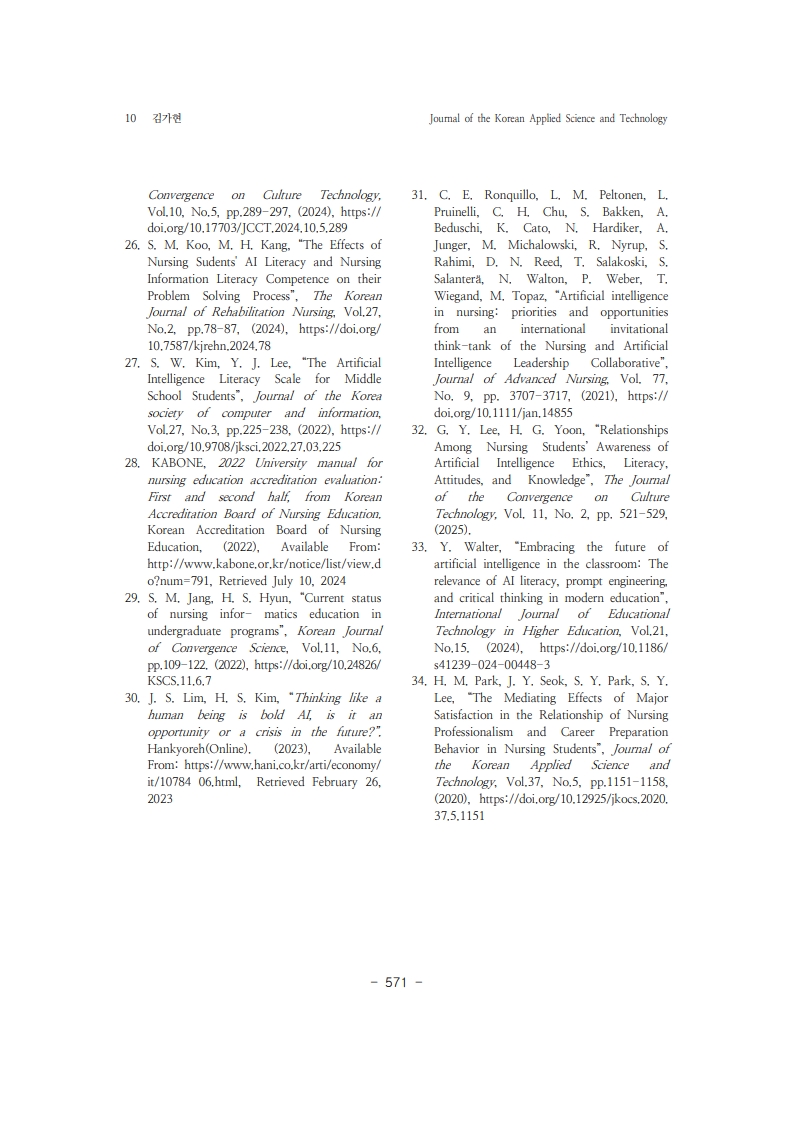
1. S. Y. Shin, "Case Study on Artificial Intelligence and Risk Management Focusing on RAI Toolkit", The journal of the institute of internet, broadcasting and
communication : JIIBC, Vol.24, No.1, pp.115-123, (2024),https://doi.org/10.7236/JIIBC.2024.24.1.115
2. J. M. Kang, S. W. Lee, "Identification Systems of Fake News Contents on Artificial Intelligence & Bigdata", International Journal of Advanced Smart Convergence(IJASC), Vol.10, No.3, pp.122-130, (2021),https://doi.org/10.7236/IJASC.2021.10.3.122
3. Z. Bahroun, C. Anane, V. Ahmed, A. Zacca, “Transforming education: Acomprehensive review of generative artificialintelligence in educational settings through bibliometric and content analysis”, Sustainability, Vol.15, No.17, pp.12983,( 2 0 2 3 ) , https://doi.org/10.3390/su151712983
4. S. Maleki, M. Forouzanfar, “The role of AI in hospitals and clinics: transforminghealthcare in the 21st century”, Bioengineering, Vol.11, No.4, pp.337,
(2024), https://doi.org/10.3390/bioengineering11040337
5. S. M. Park, I. S. Jang, “The impact of nursing students' biomedical and artificialintelligence ethical awareness, ethical values, and professional self-concept on their ethical decision-making confidence”, The Journal of Korean Academic Societyof Nursing Education, Vol.29, No.4, pp.371-380, (2023),https://doi.org/10.5977/jkasne.2023.29.4.371
6. J. W. Lee, H. D. Moon, “A study on the status of Korean artificial intelligencerecognition”, Proceedings of the Korean Institute of Communications and
Information Sciences (KICS). p.1396-1397, KICS, (2018).
7. Y. H. Seo, J. W. Ahn, "The validity and reliability of the Korean version of theGeneral Attitudes towards Artificial Intelligence Scale for nursing students", The
Journal of Korean Academic Society of Nursing Education, Vol.28, No.4 pp.357-367, (2022), https://doi.org/10.5977/jkasne.2022.28.4.357
8. Y. M. Baek, A system where an AI recordsthe tasks as nurses speak about them has been introduced for the first time in the world. Newsis, (2023), Available From:
https://www.newsis.com/view/NISX20230223_0002204138, Retrieved June 10, 2024
9. Y. G. Song, H. K. Lee, H. J. Kim, "Nursing, Robotics, TechnologicalRevolution: Robotics to Support Nursing Work", Journal of Korean Gerontological
Nursing, Vol.20, No.1 pp.144-153, (2018),https://doi.org/10.17079/jkgn.2018.20.s1.s144
10. M. M. Archibald, A. Barnard, “Futurism in nursing: Technology, robotics and the fundamentals of care”, Journal of clinical nursing, Vol.27, No.11-12, pp.2473–2480, (2017),https://doi.org/10.1111/jocn.14081.
11. K. McGrow, “Artificial intelligence: Essentials for nursing”, Nursing, Vol.49, No.9, pp.46-49, (2019).
https://doi.org/10.1097/01.NURSE.0000577716.57052.8d
12. K. J. Kim, B. Y. Jang, J. Y. Jung, O.W. Park, “The coming of the 4th industrialrevolution and the HRD issues for nurses: prospects and challenges”, Korean Journal of Human Resources Development, Vol.21,No.3, pp.137-159, (2018),
http://doi.org/10.24991/KJHRD.2018.09.21.3.137
13. M. C. Laupichler, A. Aster, M. Meyerheim,T. Raupach, M. Mergen, “Medicalstudents' AI literacy and attitudes towards AI: a cross-sectional two center study
using pre-validated assessment instruments”,BMC Med Educ, Vol.24, No.1, pp.401,(2024). https://doi.org/10.1186/s12909-024-05400-7
14. Ministry of Education, AI Education Comprehensive Plan, Ministry ofEducation, 2020.
15. S. W. Kim, Y. J. Lee, “Development of test tool of attitude toward artificialintelligence for middle school students”, Journal of The Korea Society of Computer
and Information, Vol.23, No.3, pp.17-30, (2020).https://doi.org/10.32431/kace.2020.23.3.003
16. M. J. Jo, M. O. Gu, “Development and effects of a nursing information literacycompetency education program for undergraduate nursing students”, Journal of
Korean Academic Society of Nursing Education, Vol.27, No.2, pp.210-222,(2021), https://doi.org/10.5977/jkasne.2021.27.2.210
17. Y. Yi, “New paradigm and literacy in the digital era: Focusing on digital literacy and AI literacy”, The Journal of General Education, Vol.20, pp.35-60, (2022), https://doi.org/10.24173/jge.2022.07.20.2
18. G. S. Kim, Y. Shin, “Study on the development of a test for artificialintelligence ethical awareness”, Journal of the Korean Association of Artificial
Intelligence Education, Vol.2, No.1, pp.1-19, (2020),https://doi.org/10.52618/aied.2021.2.1.1
19. J. D. Kim, S. G. Jo, “Specification and extension of the principles of biomedicalethics -Focusing on the relationship between artificial intelligence andpatients-”, Journal of Ethics Education Studies, Vol.63, pp.489-513, (2022),https://doi.org/10.18850/JEES.2022.63.17
20. J. D. Kim, “Introduction of artificial intelligence in the medical field andestablishment of biomedical ethics”, Unpublished doctoral dissertation, PusanUniversity, (2019).
21. H. J. Lim, M. S. Lee, "Development and Validation of the Pre-secondary schoolTeacher’s Artificial Intelligence Literacy Scale", Journal of Learner-Centered
Curriculum and Instruction, Vol.23, No.12 pp.875-892, (2023),https://doi.org/10.22251/jlcci.2023.23.12.875
22. M. J. Jo, “Development and validation of nursing information lit- eracy competency for hospital nurses”, Unpublished master's thesis, Gyeongsang National University, (2016).
23. M. J. Jo, M. O. Gu, “Convergence study of influence of nursing information literacy competency on problem solving ability, self-directed learning ability and clinical performance ability in nursing students”, Journal of the Korea Convergence Society, Vol.9, No.12, pp.495-507, (2018),
https://doi.org/10.15207/JKCS.2018.9.12.495
24. J. A. Song, J. W. Oh, “Analysis of the relationship between nursing students' awareness of biomedical ethics, perception of artificial intelligence, and intention to use artificial intelligence”, The Journal of the Convergence on Culture Technology, Vol.11, No.2, pp.213-222, (2025).
25. E. J. Oh, J. H. Kong, S. M. Han, “A Study on Artificial Intelligence Literacy,
Grit, and Creative Convergence Capabilities of Nursing Students”, The Journal of the Convergence on Culture Technology, Vol.10, No.5, pp.289-297, (2024),
https://doi.org/10.17703/JCCT.2024.10.5.289
26. S. M. Koo, M. H. Kang, “The Effects of Nursing Sudents' AI Literacy and Nursing Information Literacy Competence on their Problem Solving Process”, The Korean Journal of Rehabilitation Nursing, Vol.27, No.2, pp.78-87, (2024), https://doi.org/10.7587/kjrehn.2024.78
27. S. W. Kim, Y. J. Lee, “The Artificial Intelligence Literacy Scale for MiddleSchool Students”, Journal of the Korea society of computer and information, Vol.27, No.3, pp.225-238, (2022), https://doi.org/10.9708/jksci.2022.27.03.225
28. KABONE, 2022 University manual for nursing education accreditation evaluation: First and second half, from Korean Accreditation Board of Nursing Education.Korean Accreditation Board of Nursing Education, (2022), Available From:http://www.kabone.or.kr/notice/list/view.do?num=791, Retrieved July 10, 2024
29. S. M. Jang, H. S. Hyun, “Current status of nursing infor- matics education inundergraduate programs”, Korean Journal of Convergence Science, Vol.11, No.6,
pp.109-122. (2022), https://doi.org/10.24826/KSCS.11.6.7
30. J. S. Lim, H. S. Kim, “Thinking like a human being is bold AI, is it an opportunity or a crisis in the future?”.Hankyoreh(Online). (2023), Available
From: https://www.hani.co.kr/arti/economy/it/1078406.html, Retrieved February 26, 2023
31. C. E. Ronquillo, L. M. Peltonen, L. Pruinelli, C. H. Chu, S. Bakken, A.Beduschi, K. Cato, N. Hardiker, A. Junger, M. Michalowski, R. Nyrup, S.
Rahimi, D. N. Reed, T. Salakoski, S. Salanterä, N. Walton, P. Weber, T.Wiegand, M. Topaz, “Artificial intelligence in nursing: priorities and opportunities
from an international invitational think-tank of the Nursing and ArtificialIntelligence Leadership Collaborative”, Journal of Advanced Nursing, Vol. 77,
No. 9, pp. 3707-3717, (2021), https://doi.org/10.1111/jan.14855
32. G. Y. Lee, H. G. Yoon, “Relationships Among Nursing Students’ Awareness ofArtificial Intelligence Ethics, Literacy, Attitudes, and Knowledge”, The Journal of the Convergence on Culture Technology, Vol. 11, No. 2, pp. 521-529,(2025).
33. Y. Walter, “Embracing the future of artificial intelligence in the classroom: Therelevance of AI literacy, prompt engineering,and critical thinking in modern education”, International Journal of Educational Technology in Higher Education, Vol.21, No.15. (2024), https://doi.org/10.1186/s41239-024-00448-3
34. H. M. Park, J. Y. Seok, S. Y. Park, S. Y. Lee, “The Mediating Effects of MajorSatisfaction in the Relationship of Nursing Professionalism and Career Preparation
Behavior in Nursing Students”, Journal of the Korean Applied Science andTechnology, Vol.37, No.5, pp.1151-1158, (2020),https://doi.org/10.12925/jkocs.2020.37.5.1151

